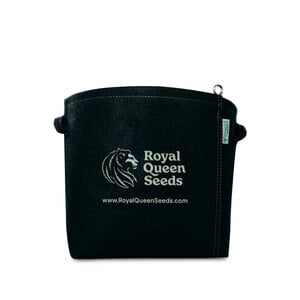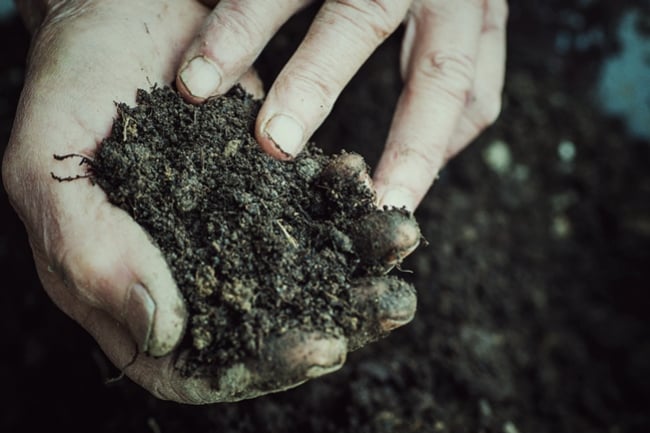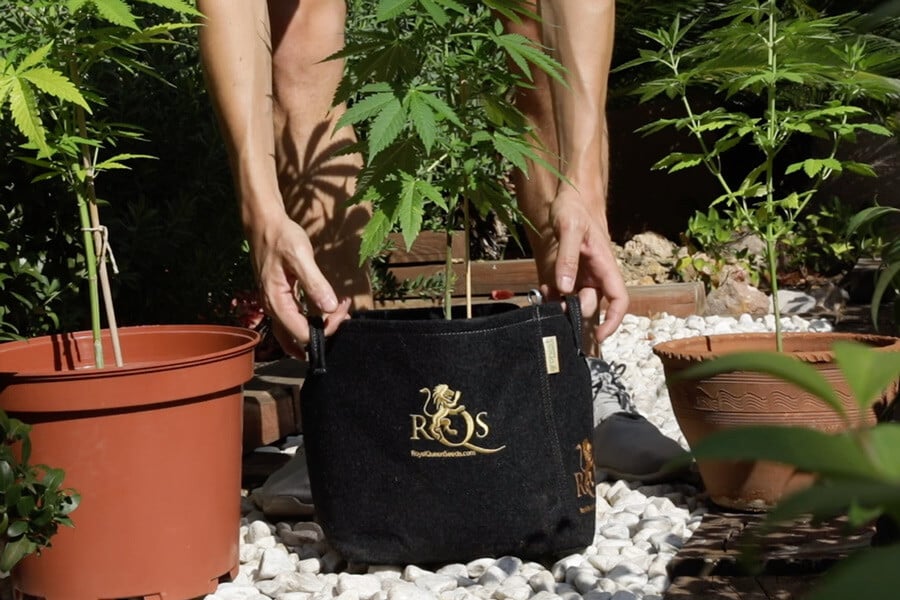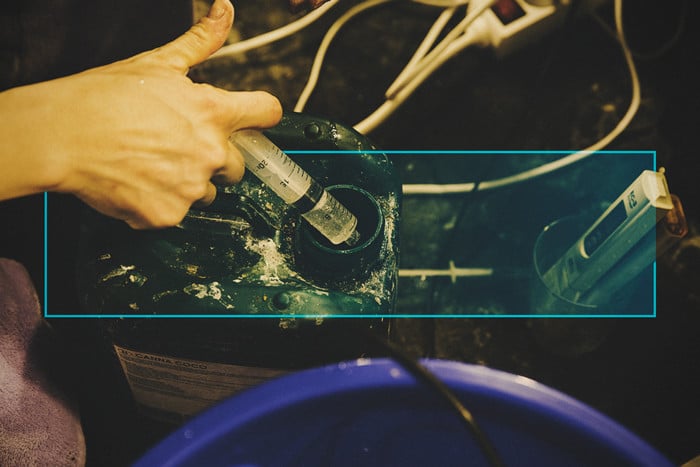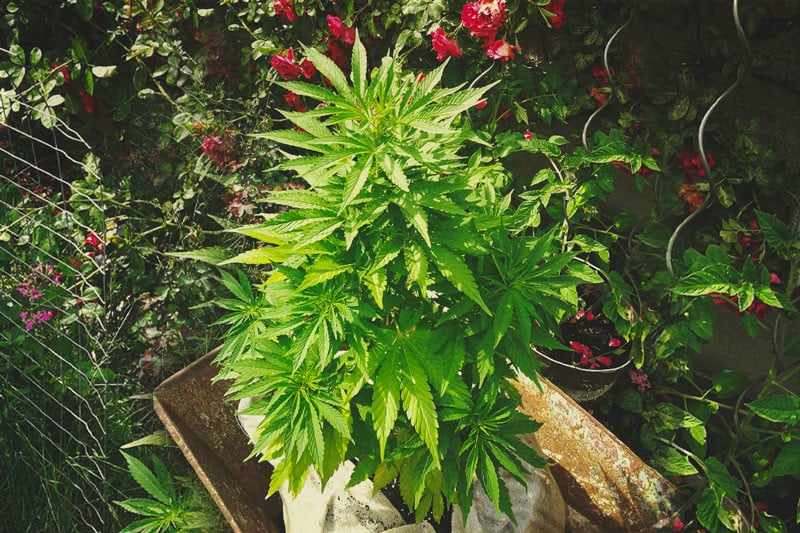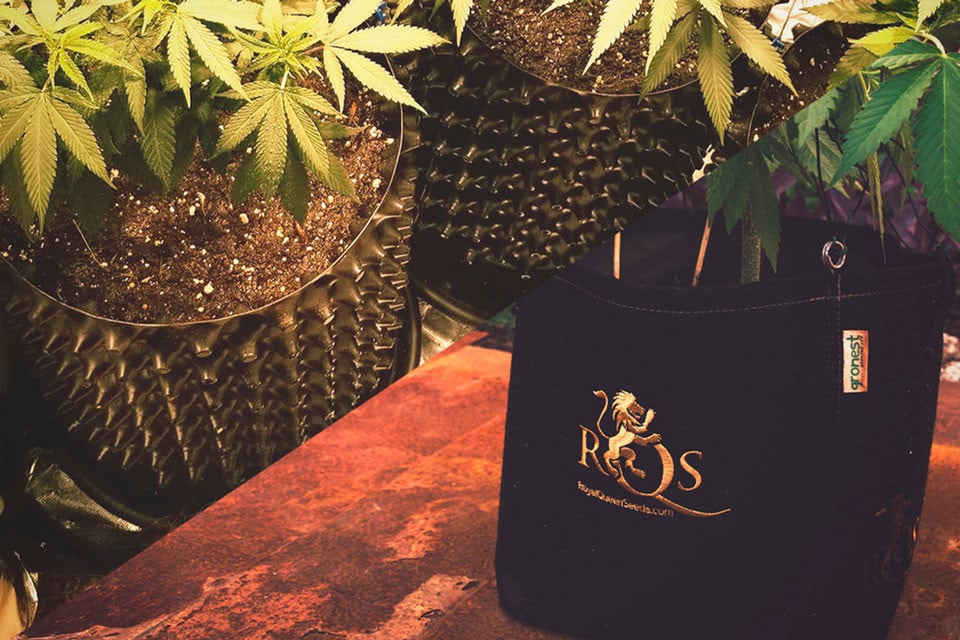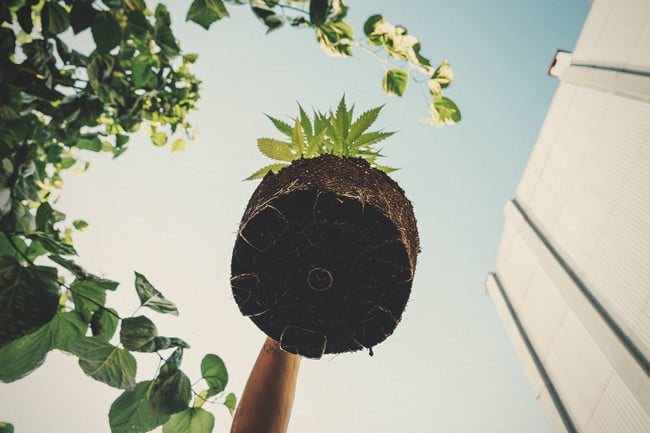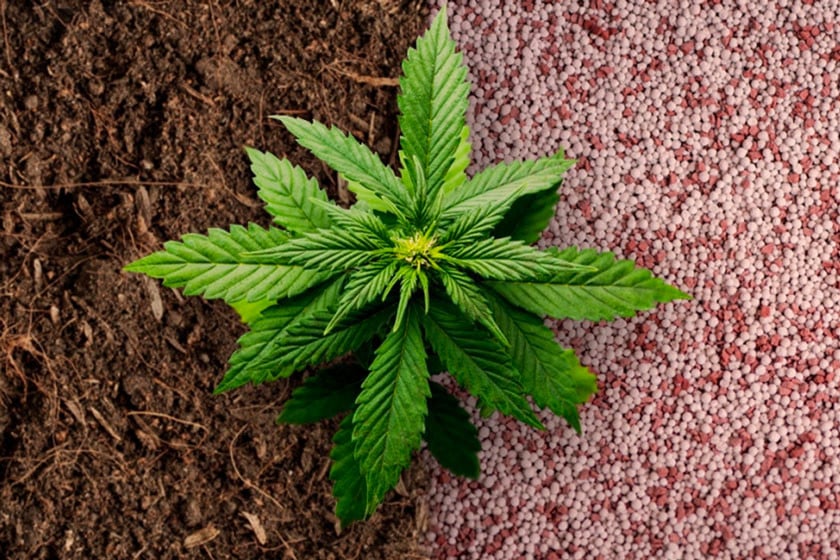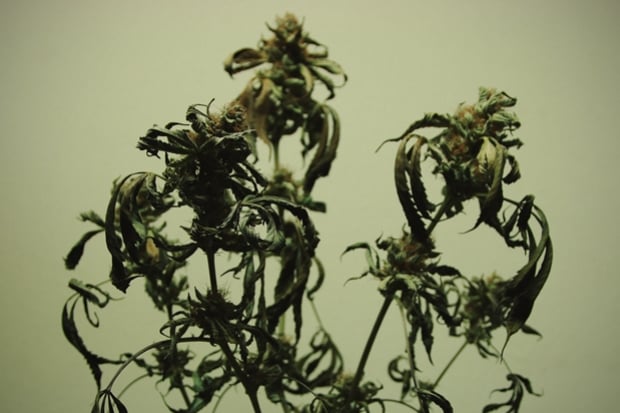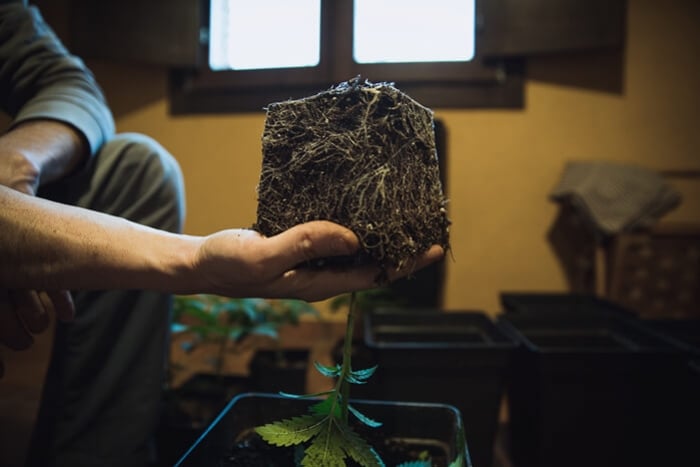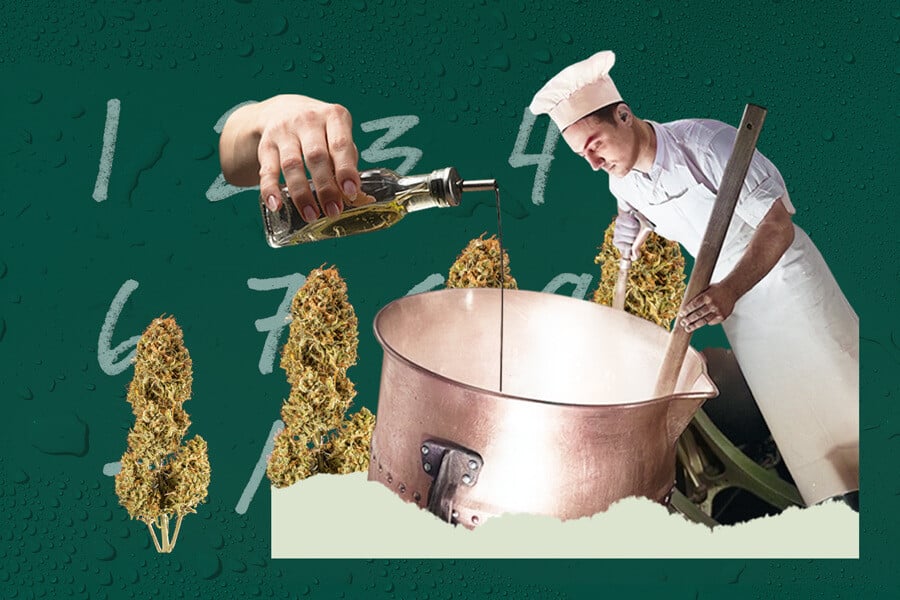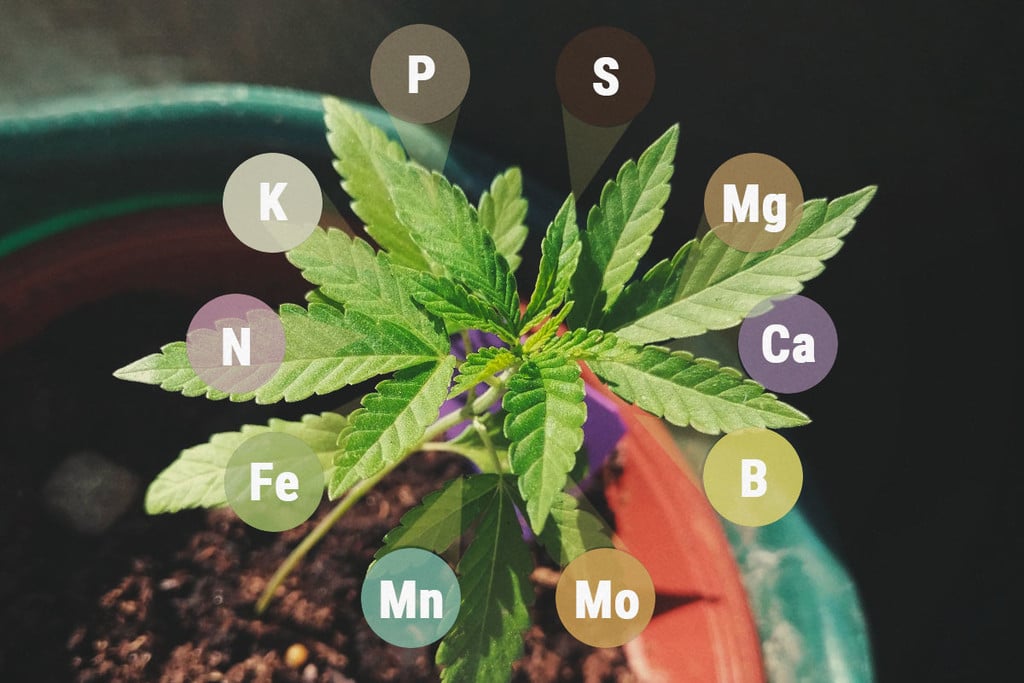.
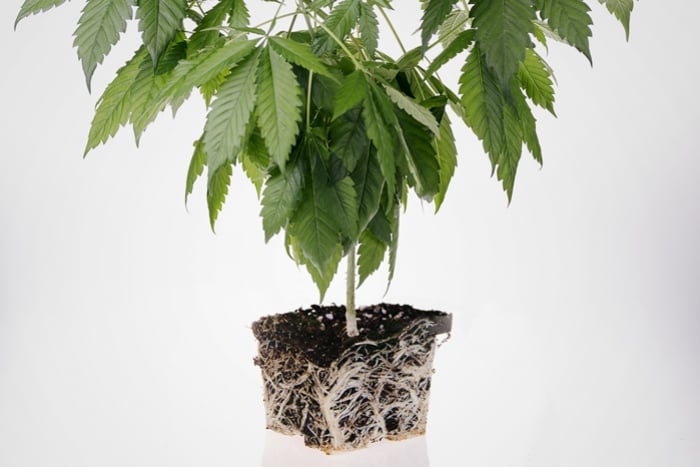
How to Prevent and Fix Rootbound Cannabis Plants
Rootbound cannabis is relatively common and, in most cases, easy to solve with no long-lasting effects. Keep reading to find out how.
Sometimes, we all feel as though we've outgrown our home. The walls seem familiar and small, and we long for somewhere bigger and more novel. Well, the same is true for cannabis (kind of). For one reason or another, cannabis plants' root systems can outgrow their pots, leading to them becoming rootbound.
Though rootbound cannabis doesn't spell immediate disaster, you should still know how to avoid it, spot it and solve it so that it doesn't develop into a more severe problem. In this article, we'll show you how to do just that.
Contents:
.jpg)
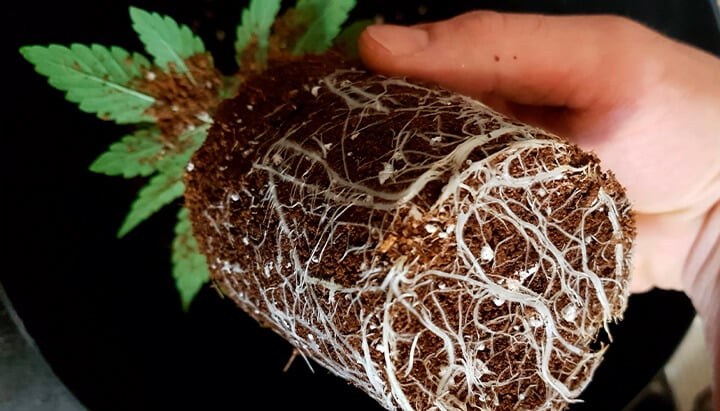
What Does It Mean if a Cannabis Plant Is Rootbound?
If cannabis is rootbound, then the plant's root system has become too big for its current pot. This might not be apparent from looking at the plant above-ground, but dive down into the subterranean rhizosphere, and you'll quickly notice that the roots look like they are pressed for space, curling around the outside of the pot.
Whilst some growers choose to keep cannabis rootbound, in most cases, it's a problem that will result in reduced growth and yield. So, no matter your skill level, learning what to do if a plant gets root-bound is essential.
Does Cannabis Like to Be Rootbound?
A minority of growers might allow cannabis to remain rootbound to restrict its growth and stop it from getting too big. If you know what you're doing, then this can work as a viable technique for limiting growth. But if you lack experience managing rootbound plants, you might end up killing them instead. So, for most, the answer is no; cannabis does not like becoming rootbound.
Pot-bound vs Rootbound
This distinction isn't so important for cannabis plants. Still, it is important for certain house plants that are prone to becoming rootbound, even in large pots.
All pot-bound plants are also rootbound, but not all rootbound plants are pot-bound. When a pot is too small, the plant becomes pot-bound, which causes it to become root-bound. But some plants can grow dense, rootbound systems even in large enough pots. Cannabis shouldn't do this, though, so the distinction is arbitrary.
Symptoms of Rootbound Cannabis Plants
Several symptoms might indicate a plant has become rootbound. These include the following:
- Yellowing/discolouring leaves
- Drooping leaves
- Stunted growth
- Nutrient deficiencies
- Soil dries extremely quickly
- Roots reaching out of the bottom of the pot
- If lifted out, the soil is a dense mass of roots curling around the perimeter of the pot
- Root rot (usually only after the root system has been bound for some time)
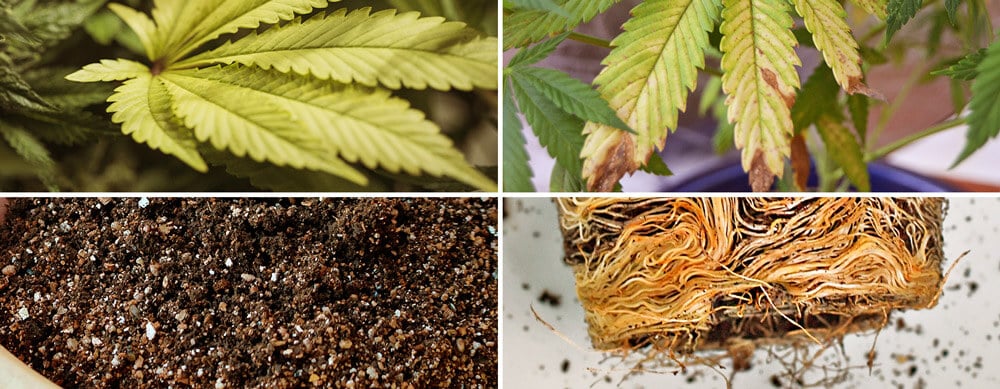
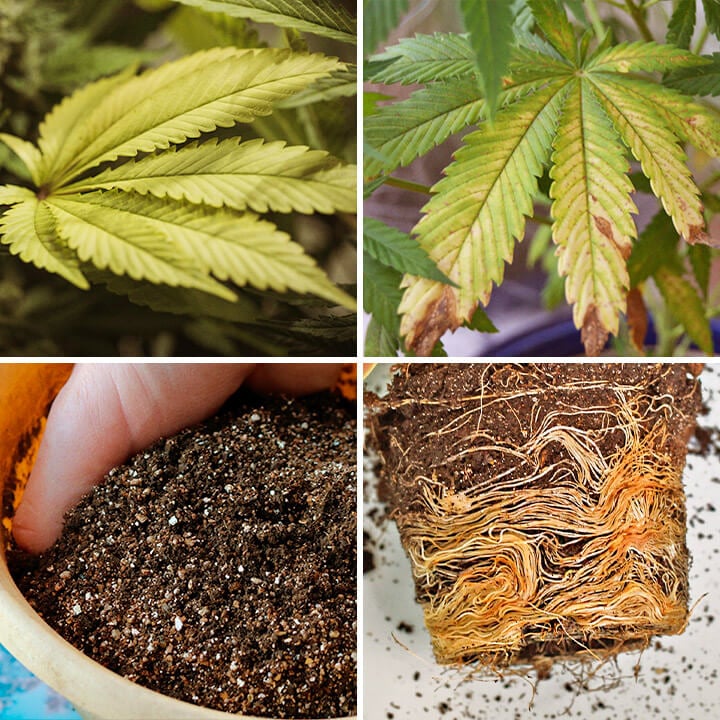
Can Rootbound Cannabis Plants Recover?
Certainly! Rootbound cannabis is fairly easy to treat and can recover into a completely healthy plant again. Still, it's important you diagnose the problem quickly, preventing it from becoming an issue with more permanent repercussions. Of all the difficulties a grower encounters, plants being rootbound is one of the simplest to solve, so don't panic.
How to Treat Rootbound Cannabis Plants
Treating rootbound cannabis is straightforward, and even true beginner growers shouldn't struggle too much to get plants back on track. So long as you follow the steps outlined below, you should be able to return your plants to full health in no time.
1. Water Cannabis Plants Well
First off, water your plants well. This will help moisten the roots and any remaining soil, making the following steps easier. You should water 1–2 before you intend to transplant your plant.
2. Prepare the New Container
Now, fill the new container about two-thirds with fresh potting soil. Dig a hole in the middle where the root ball will go, and then dampen the new soil so the plant's roots can make themselves home more easily.
3. Safely Remove Plants From Their Original Container
Now, you need to get the plant and its root system out of the original pot.
To do this, slide your fingers over the stem, placing it between your third and fourth fingers. Then, tip the pot upside down, plant and all. All being well, it should just slide out of the pot. If not, you might need to pull a little, especially if the roots have grown through the bottom of the pot. However, you shouldn't need to tug too hard, so go easy.
4. Loosen the Root Ball
Once the root ball is out, you should see that it's all roots. Now, you need to loosen them by massaging the root ball. Gently agitate the soil, which should start breaking away, slowly becoming less dense.
Sometimes, the roots will have grown around the outside to such a degree that they need to be cut before the root ball can be loosened. To do this, use a clean, sharp knife and cut vertically downwards. The plant will recover from having these exterior roots cut, but be careful not to cut the tap roots, as this can cause serious damage.
5. Prune and Wash the Roots (If Rotting)
You may or may not need to prune the roots. Often, it will be okay to just replant the plant once you've loosened the root ball. However, sometimes you might need to prune and wash them, especially if they've been bound for a while and developed root rot.
Healthy roots will look white, and you'll clearly be able to distinguish one from the other. Rotting roots will appear brown and wet and will group together in an indistinct mush. If they are rotting, you should remove these sections, or the rot will continue to spread even when plants are repotted.
Cut off all discoloured roots, even if they look otherwise healthy. Then, once you have only white roots, you should wash the remainder in a hydrogen peroxide and water solution—killing off any remaining infection. Lastly, thoroughly rinse the roots with water, and you're good to go.
6. Replant in a Larger Container
Once everything is ready, you should position the plant in the new container. Place the root system into the hole you prepared earlier and then fill in any gaps with more fresh soil. And, while you want the plant to be sturdy in its new home, you don't want the new soil to be too compact, as this will make it more difficult for the roots to spread anew. To help the root system settle in, water well and then leave plants to recover.
If you had to prune and clean the roots, you can expect to wait around two weeks before the plant resumes growth.
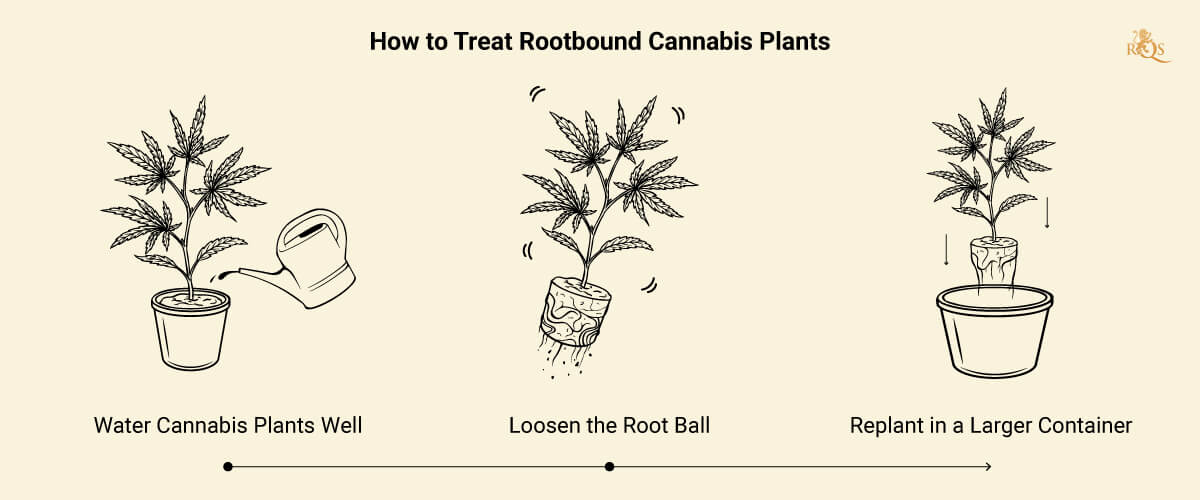
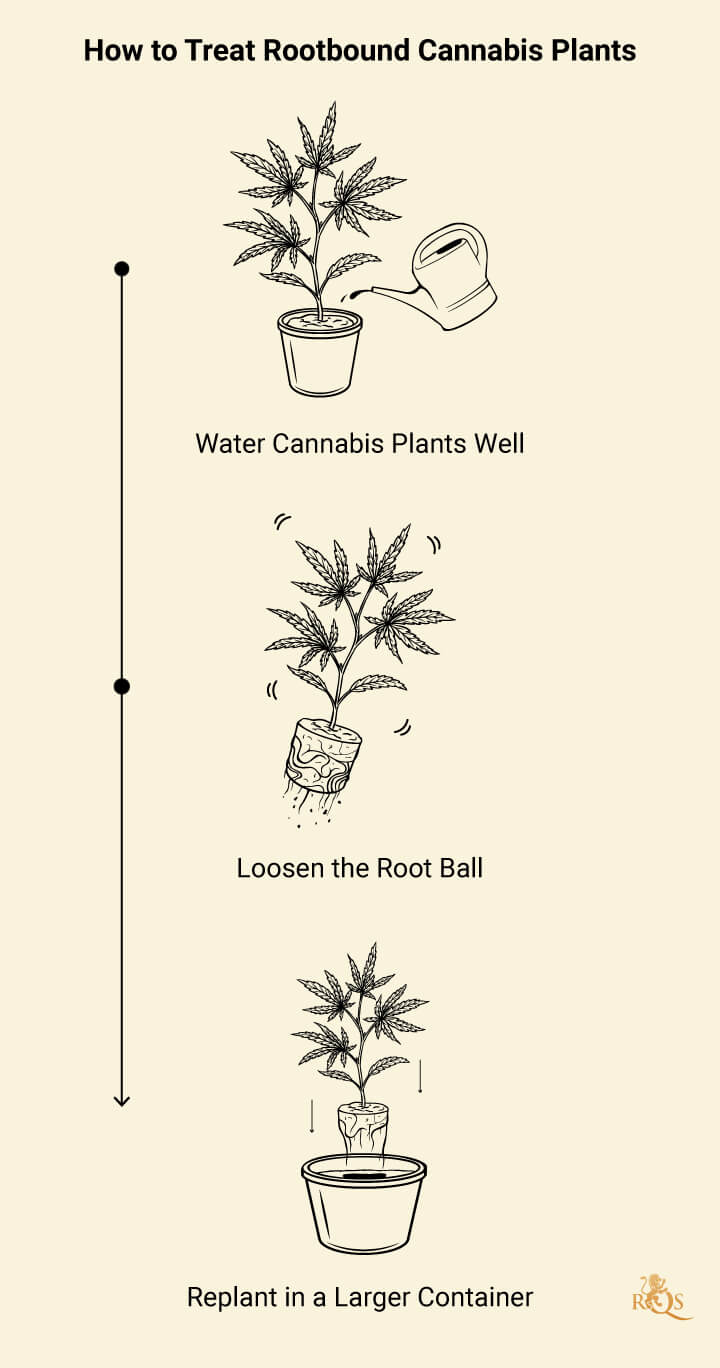
How to Prevent Rootbound Cannabis Plants
Preventing cannabis from becoming rootbound is certainly easier than reversing the problem once it's occurred. For the most part, it comes down to pot size, but the type of container you use can also make root binding more or less likely.
Calculate Your Pot Size
You must calculate the correct pot size for your plants. A seedling can make do with a very small pot—under one litre. However, it won't be long before you need to transplant it to a bigger pot. For most growers, it makes the most sense if this is the plant's final pot.
There are a couple of factors to consider when choosing final pot sizes—first, the expected final size of your plant. A strain's genetics are the main factor here, dictating the plant's maximum possible size. Some plants remain small and require smaller pots, whilst others will inevitably need more space.
A plant's size is also influenced by when you flip it to flowering, as the longer you wait, the bigger the plant will be. It's hard to give an exact figure, but generally speaking, a 15-litre pot should be adequate for most indoor growing scenarios and should help prevent root-related issues.
If you're growing outdoors, you'll need to increase the pot size, as plants will usually become much larger. Autoflowers should still be okay in those smaller containers, but photoperiod plants shouldn't be planted in containers of less than twenty litres.
Consider Using Air Or Fabric Pots
Air and fabric pots increase airflow around the root system, which tells them to stop growing. As such, they're less likely to become rootbound as they will naturally discover the limits of their growing space and restrict their own growth. Moreover, fabric and air pots allow for better drainage and aeration, which cannabis plants love, so it's a win-win.
Plan When You'll Transplant Your Cannabis
When you start growing, you should have a rough idea of when you'll transplant and have the relevant pots ready to go.
Seedlings are generally ready to transplant after 10–14 days—or when they have three true sets of leaves. Following both these rules should mean that you will transplant seedlings at the right time. When it comes to transplanting throughout the vegetative phase, you should know that plants (conversely) grow faster in smaller spaces, and you'll need to upgrade the pot size every few weeks until they reach their final container.
Note: Unless they are rootbound or suffering from other root-related issues, never transplant a flowering cannabis plant. At this point, they're no longer focusing on developing plant structure, and unless they're rootbound, they will not need a larger pot!
Don't Let Rootbound Cannabis Spoil Your Harvest
Being on the lookout for rootbound cannabis is a good idea, as it's a simple problem to solve if you catch it early. For most cultivators, if you transplant appropriately, your plants shouldn't become rootbound in the first place, which makes life very straightforward.
Avoiding rootbound problems is simply good practice, as it can stunt growth and, left long enough, can even kill off plants if it leads to root rot. However, you shouldn't feel too threatened by root-related issues, and if in doubt, remember—more space means better growth and bigger yields!


























